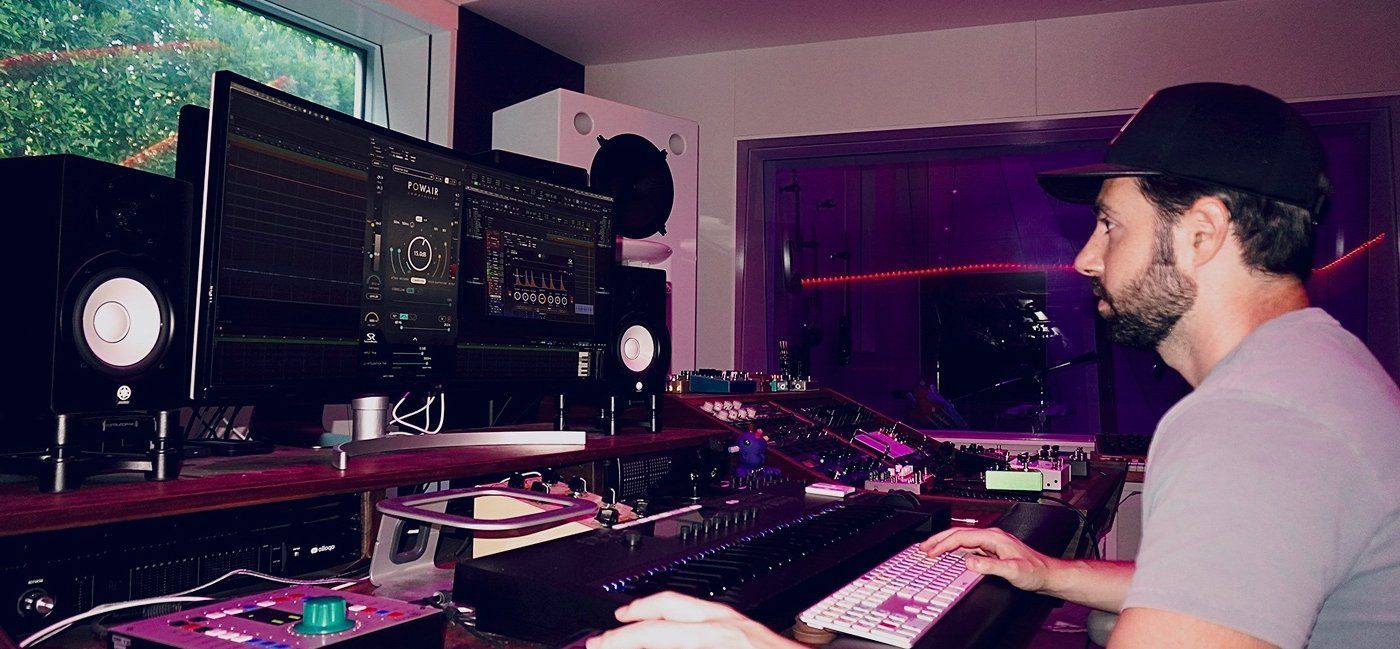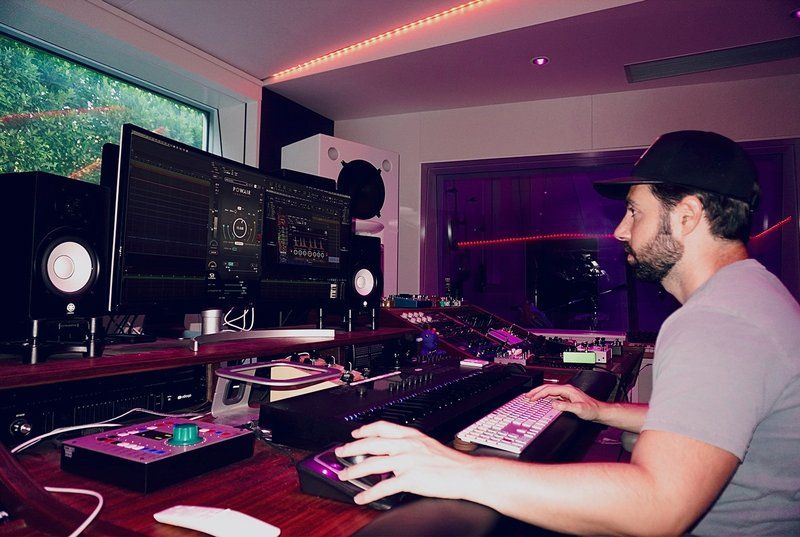
Whatever It Takes To Get Things Right
I am most relaxed when things are just not rushed in the creative process.
Mick Schultz
Mick Schultz is a Grammy-nominated music producer and songwriter and has been the creative powerhouse behind some of the biggest R&B and pop tracks that reached multi-platinum status - Jeremih’s "Birthday Sex," "Down on Me," and "Don't Tell 'Em" as well as the platinum hit "Replay" by Zendaya. Amongst other notable artists, he also worked with Rihanna and Kelly Clarkson. Mick goes deep on bridging the pop/hip-hop divide and developed his interest in sound as well as his musical abilities at a very early age. We talked with him about his clear passion for the role of producing music, being involved in the complete music production process, designing the right studio environment, and the way he chooses plug-ins for streamlining processes.
Mick, what were the inspirations along the way for you—musically and philosophically, that got you into the world of music production?
I got into music and production pretty young, around 10/11 years old. I was fascinated by the sound (sonics) of music. I remember always wondering how or what certain sounds were that I was hearing. Hip-hop was what made me want to produce because I was hearing sounds and samples manipulated in ways that just made my head turn. I pretty much just started to “figure it out” as a teenager by experimenting every day and really never stopped!
Yours and Jeremih’s first hit, “Birthday Sex” went viral in 2009. Is it correct that you weren’t signed to any record label at that time and managed this successful outcome solely on your own?
After all the record labels passed on doing any deals with us. We decided to release some music on our own. Birthday Sex was kind of the first real push. We dropped it on our own. With the help of our manager at the time, we got a spin on the radio, and the reaction was crazy. People started reacting, calling, and talking about the song. It was purely organic. Everyone loved it, and it just started to grow day after day. Ultimately, after the song was already climbing up the billboard charts, we decided to do a deal with Def Jam to bring the record all the way to #1.
How did your career accelerate after that? What changed?
A lot changed, but a lot kind of stayed the same too. I was already 100% focused on building with Jeremih growing the sound we started together. The hit record just fueled the fire and drive for me, even more when it came to the music. There were definitely more distractions after things took off, (for Jeremih), more shows, more interviews, more everything. So learning to balance that with recording was a change.
How's it to work with Rihanna?
Rihanna did all her recording with her engineer, so I didn’t creatively work directly with her. But she is incredible at delivering the vocal just the way the song needs it to be done.
From a creative point of view, how do you navigate between the music production and songwriting processes - do you have a specific workflow in shaping the song?
I approach it in all different directions depending. Really whatever each project asks for. Sometimes I’ll bring in full beats and tracks to be written to. In other situations, the song will get written as I produce at the same time. Or even write a song in its rawest form and then take that idea and build music around it later. There is no best way for me. They all just deliver different types of results. If you have no song to build around, then you are limitless with the music, which can also be challenging. There are great powers in limitation. When you have a song written, you can produce just what the song is asking for, and you basically have a guide to work around.
I always focus on the feel when creating.
And do you ever look back on anything and feel like you'd like to change any of the things that you've written or produced?
I'm a forever student of my craft, and I am always evolving my production and sound. What I produce today is not something I would have ever made ten years ago and vice versa. So, of course, sometimes when I hear something I made a long time ago, I think, oh I could have added this or done something different here. A song is never really done. You can always change things. You just have to know when it feels right at that moment.
The industry regards you as someone who knows his gear and creates an aesthetic and comfortable working environment – so what makes you feel relaxed when working on new materials?
I am most relaxed when things are just not rushed in the creative process. I know how to work fast, and I can work super quickly if I need to. But I like to give my ideas and give the records I work on the time to evolve into something great. I’ve had many records come together in a day. It happens. But I enjoy it the most when there is time to explore and push things past their breaking point (even if the idea came quick). Sometimes you have to go down a few different paths to then pull back and know that where you were at in the beginning was where you should end up.
Please talk a little bit about your gear. What’s your studio setup like, what’s essential to you?
I run a Pro Tools HDX system in my studio. Then I have a huge patch bay that links all my outboard gear. Everything in my studio is ready to be recorded, and the mics are set up all around the live room. All the synths are patched in, ready to go. So when inspiration hits, there is no waiting time. My go-to vocal chain is a Sony C800g to the CL1b, into a NEVE 1073.
And how do you value new plug-ins? Is it just trying them out of the box, or do you get a recommendation from others in the industry?
Technology is incredible, and I constantly follow (by obsession) everything that is coming out in the market. I am always willing to try new things, I get some recommendations, but usually I am the one doing the recommending!

Process-wise, do you tend to track things to sound as they will be in the final mix, rather than sticking it down clean and sorting it out at the end of the process?
I always focus on the feel when creating. I think it is really important to try and get things to sound how you vision them to be in the end. I’ll do whatever it takes to get things to sit right from the jump as long as it doesn’t seem to be slowing down the flow or killing inspiration. With the power of incredible plugins and samples, I think it's not only expected but really important to have your demo’s sound polished. It all affects the vibe and mood of the record. So whatever I can do as I am recording to get it as close to sounding final without hurting the process, I’ll do it.
POWAIR is one of my go-to compressors when I want to really make a sound come alive. The punch knob is so good.
Please break down the usage of Sound Radix POWAIR, Drum Leveler, and SurferEQ in your mixes.
I like to use Drum Leveler on my drum bus for gluing layers together and really shaping the drums more. SurferEQ helps me tame resonants fast when recording without having to go in and notch out each individual frequency. It’s a quick and easy tool.
What advice would you give to newcomers to the industry?
It’s amazing how much opportunity the internet has given producers all over the world to collaborate and get placements. However, I think it’s still really important to network in person and make those relationships. Working in person can really help you learn and grow and also help bring in more opportunities. Also, never stop experimenting and never be afraid to share your music. You will always do something new, so it’s good not to wait and sit on things too long.